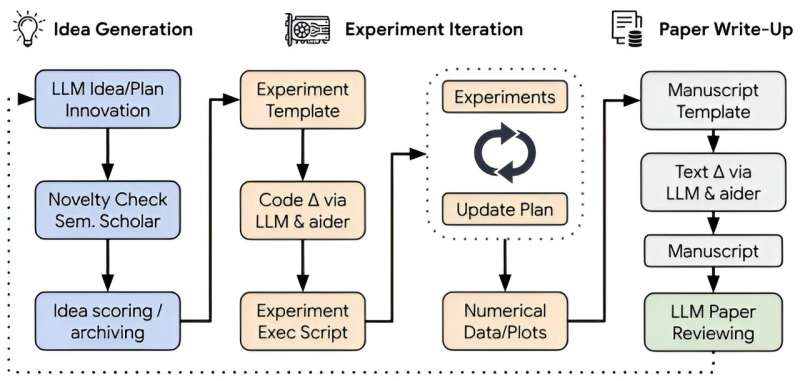
August 15, 2024 by Bob Yirka , Tech Xplore
Collected at: https://techxplore.com/news/2024-08-ai-scientist-scientific-autonomously.html
A team of AI researchers at Sakana AI, in Japan, working with colleagues from the University of Oxford and the University of British Columbia, has developed an AI system that can conduct scientific research autonomously.
The group has posted a paper to the arXiv preprint server describing their system, which they call “The AI Scientist“. They have also posted an overview of their system on Sakana’s corporate website.
Scientific research is generally a long and involved process. It tends to start with a simple idea, such as, “Is there a way to stop the buildup of plaque on human teeth?” Scientists then research other studies to determine what research has been done on the topic.
After that, they draw up a plan of action, followed by a needs assessment and a cost analysis. If all goes well, a project is initiated and people and material needs are assigned. That is followed by the actual research and the subsequent writing of a research paper to detail the process used and findings. After that, if merited, the paper is published and use is made of the reported discoveries.
This general process can be long, difficult and often expensive, mostly because of manpower costs. In this new effort, the research team eliminated the manpower costs by automating the whole process, from the generation of ideas to delivery of the written paper.
The AI system uses LLMs to mimic the scientific research process and has already been tested by prompting it to carry out tasks related to AI research, which means it is already conducting research with the goal of finding ways to improve its own abilities. The researchers claim their system is currently conducting real science, and as part of such efforts, it is producing acceptance-level papers.
If these claims are validated, this development is likely to have a major impact on the research community. If AI systems begin conducting the kind of research now done by people, millions of jobs could be lost, universities could see enrollments drop and research funding could be dramatically reduced.
On the other hand, such research could lead to major breakthroughs in areas like cancer research, drug development, climate mitigation strategies or perhaps finding a true understanding of such mysteries as gravity, dark matter or why life exists on Earth and seemingly nowhere else.
More information: Chris Lu et al, The AI Scientist: Towards Fully Automated Open-Ended Scientific Discovery, arXiv (2024). DOI: 10.48550/arxiv.2408.06292
Github: github.com/SakanaAI/AI-Scientist
Sakana.ai: sakana.ai/ai-scientist/
Journal information: arXiv

Leave a Reply